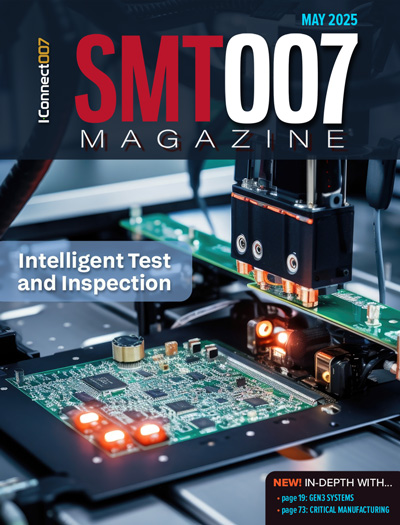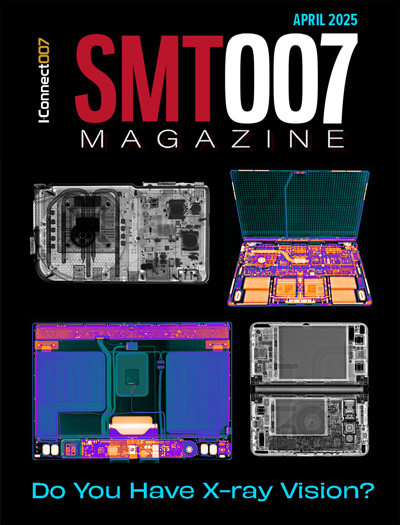-

- News
- Books
Featured Books
- smt007 Magazine
Latest Issues
Current Issue
Moving Forward With Confidence
In this issue, we focus on sales and quoting, workforce training, new IPC leadership in the U.S. and Canada, the effects of tariffs, CFX standards, and much more—all designed to provide perspective as you move through the cloud bank of today's shifting economic market.

Intelligent Test and Inspection
Are you ready to explore the cutting-edge advancements shaping the electronics manufacturing industry? The May 2025 issue of SMT007 Magazine is packed with insights, innovations, and expert perspectives that you won’t want to miss.

Do You Have X-ray Vision?
Has X-ray’s time finally come in electronics manufacturing? Join us in this issue of SMT007 Magazine, where we answer this question and others to bring more efficiency to your bottom line.
- Articles
- Columns
Search Console
- Links
- Media kit
||| MENU - smt007 Magazine
Solving Reliability and Thermal Management Challenges in Automotive Electronics
May 1, 2018 | Stephen Las Marias, I-Connect007Estimated reading time: 3 minutes
Paul Salerno is the global portfolio manager for SMT assembly solutions at Alpha Assembly Solutions. He has more than a decade of experience in the electronics assembly industry in roles such as application engineering, project management, and product management. Paul is responsible for developing and executing strategies for the automotive and consumer electronics market segments, ensuring Alpha’s products continue to meet the evolving needs of their global customers.
In this interview with SMT007 Magazine, Paul discusses the growing automotive electronics industry, its impact on the soldering materials business, and how Alpha helps customers address the new challenges and requirements in the automotive market.
Stephen Las Marias: The automotive electronics market has been one of the driving forces of the electronics manufacturing industry. What is the impact of this on your business?
Paul Salerno: The solder market continues to flourish, and we see an upward demand for automotive electronics from OEMs due to the sophistication required for modern vehicles. The continual adoption of the HEV/EV powertrain, advanced driver-assist systems (ADAS), and in-cabin electronics is driving the need for more sophisticated assembly solutions. For example, advanced detection systems such as lane departure warning, adaptive cruise control, LIDAR, RADAR, and vision systems that were once reserved for luxury vehicles are now becoming more common in the average consumer vehicle. Each one of these technologies presents itself with unique challenges that require customized solutions.
Las Marias: What are some of these “unique challenges”?
Salerno:Reliability, of course, is a major driving factor to the successful implementation of an assembly material in automotive electronics. Specifically, exposure to high-temperature and high-vibrational environments for powertrain and advanced detection devices creates a need for assembly materials that exhibit excellent creep resistance. The combination of the end product’s performance requirements as well as exposure to environmental stresses is driving increased reliability demands on the assembly materials.
Thermal management is critical from both application and processing perspectives. In
powertrain applications facing high-operating temperatures, the ability to develop creep resistant alloys capable of facing temperature ranges from -40°C to 150°C is driving the need for high-reliability alloys such as InnoLot. Thermal management from a processing perspective is driving the need to develop low-temperature alloys capable of high reliability to prevent component warpage during reflow. Alpha’s HRL1 alloy exhibits excellent mechanical reliability relative to SAC305 while reducing processing temperatures by 50°C. This has proven to have a profound impact on reduction of component warpage leading to increased yields and enhanced product performance.
Las Marias: How do you help ensure the reliability of electronics assemblies for cars?
Salerno:The answer to this question really begins with the relationship we maintain with our customers. Maintaining a strong voice of customer enables Alpha to develop next generation products to meet the upcoming needs of the marketplace. Having a global R&D and technical service footprint allows Alpha the flexibility to quickly address customer needs, albeit on a production line or in the lab. We maintain a cutting edge analytical and diagnostic lab capable of characterizing assembly performance through use of equipment such as SEM/FEM, as well as conducting field tests such as thermal cycling and surface insulation resistance to qualify the performance of our products in a given application. For example, the ability to measure electrochemical migration and corrosion resistance of our solder pastes on fine-pitch components ensures the reliability of our products in advanced detection devices.
Las Marias: Are there new requirements being placed upon you by your customers dealing with automotive electronics?
Salerno: As always, demands are unique to the given application. The need for assembly materials capable of meeting operating temperatures above 120°C is commonplace for devices located closest to heat-generating sources of the vehicle. We are seeing thermal cycling demands of -40°C/150°C with requirements above 2,000 cycles for these powertrain applications. For advanced safety detection systems, not only are thermal cycling requirements increasing, but there is a growing need for fine pitched electrochemical reliability. It is not uncommon to see power density increasing and component sizes shrinking as these advanced detection devices become more sophisticated and miniaturized. Finally, for in-cabin electronics, a focus on total cost of ownership is driving the need for low-temperature, high-reliability alloys.
To read the full article, which appeared in the April 2018 issue of SMT007 Magazine, click here.
Suggested Items
Preventing Surface Prep Defects and Ensuring Reliability
06/10/2025 | Marcy LaRont, PCB007 MagazineIn printed circuit board (PCB) fabrication, surface preparation is a critical process that ensures strong adhesion, reliable plating, and long-term product performance. Without proper surface treatment, manufacturers may encounter defects such as delamination, poor solder mask adhesion, and plating failures. This article examines key surface preparation techniques, common defects resulting from improper processes, and real-world case studies that illustrate best practices.
Breaking Silos with Intelligence: Connectivity of Component-level Data Across the SMT Line
06/09/2025 | Dr. Eyal Weiss, CybordAs the complexity and demands of electronics manufacturing continue to rise, the smart factory is no longer a distant vision; it has become a necessity. While machine connectivity and line-level data integration have gained traction in recent years, one of the most overlooked opportunities lies in the component itself. Specifically, in the data captured just milliseconds before a component is placed onto the PCB, which often goes unexamined and is permanently lost once reflow begins.
BEST Inc. Introduces StikNPeel Rework Stencil for Fast, Simple and Reliable Solder Paste Printing
06/02/2025 | BEST Inc.BEST Inc., a leader in electronic component rework services, training, and products is pleased to introduce StikNPeel™ rework stencils. This innovative product is designed for printing solder paste for placement of gull wing devices such as quad flat packs (QFPs) or bottom terminated components.
See TopLine’s Next Gen Braided Solder Column Technology at SPACE TECH EXPO 2025
05/28/2025 | TopLineAerospace and Defense applications in demanding environments have a solution now in TopLine’s Braided Solder Columns, which can withstand the rigors of deep space cold and cryogenic environments.
INEMI Interim Report: Interconnection Modeling and Simulation Results for Low-Temp Materials in First-Level Interconnect
05/30/2025 | iNEMIOne of the greatest challenges of integrating different types of silicon, memory, and other extended processing units (XPUs) in a single package is in attaching these various types of chips in a reliable way.


